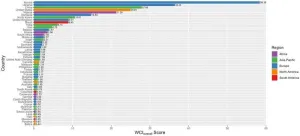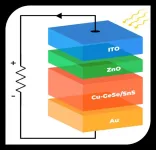(Press-News.org) The U.S. Department of Energy’s (DOE) Innovative and Novel Computational Impact on Theory and Experiment (INCITE) program is now accepting proposals for high-impact, computationally intensive research projects in a broad array of science, engineering and computer science domains. Proposals must be submitted between April 10 and June 14.
The INCITE program aims to accelerate scientific discoveries and technological innovations by awarding researchers with substantial allocations of supercomputer time and supporting resources at the Argonne Leadership Computing Facility (ALCF) and the Oak Ridge Leadership Computing Facility (OLCF). The ALCF and OLCF are DOE Office of Science user facilities located at DOE’s Argonne National Laboratory and Oak Ridge National Laboratory, respectively.
“INCITE is the flagship program for leadership computing. Every year, there is real excitement to see the impactful and challenging science projects that researchers are trying to tackle,” said Katherine Riley, ALCF director of science. “As we move fully into the era of exascale computing, I look forward to fantastic proposals.”
Open to researchers around the world from academia, industry and government agencies, the INCITE program will award up to 60% of the allocable time on DOE’s leadership-class supercomputers: the OLCF’s Frontier, a 1.2 exaflops HPE Cray EX machine; ALCF’s Polaris, a 34 petaflops (44 petaflops of Tensor Core FP64 performance) HPE Cray machine; and Aurora, an Intel-HPE Cray EX system with a theoretical peak performance of more than 2 exaflops. Proposals may request project durations from one to three years.
“I’m excited to see how investigators from a variety of scientific disciplines are thinking about using our world-leading and globally unique computational resources and expertise through the INCITE program,” said ORNL’s Bronson Messer, OLCF’s director of science. “Pushing the frontiers of discovery in every scientific domain is a hallmark of leadership computing and INCITE lies firmly at the heart of that enterprise.”
In addition to seeking traditional simulation-based projects, the call for proposals is open to projects involving applications in data science, such as data-intensive computing and machine learning, and projects with complicated workflows. Furthermore, crosscutting proposals that integrate simulation, data and learning methods are encouraged.
Every proposal undergoes a peer-review process aimed at pinpointing projects with the highest potential for impact and a clear need for leadership-class systems to tackle significant challenges. Applications are also assessed for computational readiness to gauge how efficiently the proposed projects will use the requested systems.
INCITE is once again committing 10% of allocable time to an Early Career Track in 2025. Since 2022, the program has sought to encourage the next generation of high performance computing researchers by focusing on principal investigators (PI) who have earned a doctorate degree within the last 10 years. Researchers who earned their Ph.D. on or after Dec. 31, 2014, and who have not served as PI on a previous INCITE project are eligible. Applicants’ project proposals will go through the regular INCITE Technical Assessment (previously called Computational Readiness) and Peer Review process, but the INCITE management committee will consider meritorious projects in the Early Career Track separately.
To submit a proposal or read additional details about the requirements, visit https://www.doeleadershipcomputing.org/call-for-proposals/. Proposals will be accepted until 8 p.m. ET on Friday, June 14. Awards are expected to be announced in November.
For more information on the INCITE program and a list of previous awards, visit www.doeleadershipcomputing.org.
Preparing for INCITE
The INCITE program will host informational webinars on April 23 and May 7. Registration links will be posted here when available: https://doeleadershipcomputing.org/informational-webinars/.
The Argonne Leadership Computing Facility provides supercomputing capabilities to the scientific and engineering community to advance fundamental discovery and understanding in a broad range of disciplines. Supported by the U.S. Department of Energy’s (DOE’s) Office of Science, Advanced Scientific Computing Research (ASCR) program, the ALCF is one of two DOE Leadership Computing Facilities in the nation dedicated to open science.
Argonne National Laboratory seeks solutions to pressing national problems in science and technology. The nation’s first national laboratory, Argonne conducts leading-edge basic and applied scientific research in virtually every scientific discipline. Argonne researchers work closely with researchers from hundreds of companies, universities, and federal, state and municipal agencies to help them solve their specific problems, advance America’s scientific leadership and prepare the nation for a better future. With employees from more than 60 nations, Argonne is managed by UChicago Argonne, LLC for the U.S. Department of Energy’s Office of Science.
The U.S. Department of Energy’s Office of Science is the single largest supporter of basic research in the physical sciences in the United States and is working to address some of the most pressing challenges of our time. For more information, visit https://energy.gov/science.
END
U.S. Department of Energy’s INCITE program seeks proposals for 2025 to advance science and engineering at U.S. leadership computing facilities
Researchers can apply for access to DOE’s exascale supercomputers
2024-04-10
ELSE PRESS RELEASES FROM THIS DATE:
Organizations need to beware whispering death from “institutional parasites”, study finds
2024-04-10
Organisations that fail to identify or swiftly expel “institutional parasites” risk long-term damage, academics from leading British and Finnish business schools have warned.
In a paper published in the respected Academy of Management Review, they argue that the increasingly complex and opaque nature of many organisations provides fertile ground for institutional parasites – such as suppliers or other key external partners and employees.
Dr Jukka Rintamäki from Finland’s Aalto University School of Business, Dr Simon Parker from Nottingham University Business School and Professor Andre Spicer, Professor ...
New book helps citizen scientists navigate complexities of infectious disease outbreaks
2024-04-10
WASHINGTON (April 10, 2024) — Citizen scientists have long contributed to the collection and observation of natural events - from weather watchers to wildlife trackers – with thousands of organized community projects spanning decades. Beginning in 2020, the COVID-19 pandemic gave rise to an explosion of novice infectious disease detectives adding to the collection of science-enthusiasts.
To give these new disease detectives more tools for their craft, a new book written by two Georgetown University global health researchers, “Outbreak ...
UT Extension specialist chosen to help support national immunization program
2024-04-10
A University of Tennessee Extension specialist has been selected to assist land-grant university teams implementing grants through the Extension Collaboration on Immunization Teaching and Engagement (EXCITE), a national effort to encourage adult vaccinations in rural areas and among underserved communities.
Laura Clark, UT Extension state specialist in family and consumer sciences, will serve as a national EXCITE Bridge Grant coach and work with six land-grant universities that are grant recipients through the program. Clark has worked for UT Extension for six years, ...
Economic wealth may be linked with happiness in China – if inequality is low
2024-04-10
A country’s economic prosperity is linked with improved well-being in its residents, according to a study published April 10, 2024 in the open-access journal PLOS ONE by Feng Huang from the Chinese Academy of Sciences, and colleagues.
Philosophers have long pondered the fraught relationship between money and happiness. Aristotle and Solon argued against the euphoric powers of wealth, while the Easterlin Paradox suggests that a nation’s economic fortitude can influence its residents’ health and happiness. Little evidence exists to support this claim in China, especially after the country’s recent economic expansion and rapid industrialization.
Huang and colleagues ...
Most cybercriminal threats are concentrated in just a few countries
2024-04-10
A newly developed World Cybercrime Index shows that most cybercriminal threats are concentrated in several countries, with different countries associated with distinct cybercrime types. Miranda Bruce (University of Oxford/University of New South Wales), Jonathan Lusthaus (University of Oxford), Ridhi Kashyap (University of Oxford), Nigel Phair (Monash University), and Federico Varese (Sciences Po) present these findings in the open-access journal PLOS ONE on April 10, 2024.
Worldwide, cybercrimes are estimated to cost hundreds ...
US building footprints could help identify neighborhood sociodemographic traits
2024-04-10
An analysis of building footprints in major US metropolitan areas identifies five different neighborhood types that vary in footprint size, shape, and placement, and which are statistically associated with varying neighborhood socioeconomic and demographic traits. Noah Durst of Michigan State University, US, and colleagues present these findings in the open-access journal PLOS ONE on April 10, 2024.
People have long studied the shape and placement of human settlements—“neighborhood morphology”—to help inform urban planning and management. Recent technological advancements, such as high-resolution satellite imagery and more powerful computational ...
Indigenous Australian message sticks, which feature markings to convey messages over long distances, analyzed for first time at scale through new database of 1,500 artifacts
2024-04-10
Indigenous Australian message sticks, which feature markings to convey messages over long distances, analyzed for first time at scale through new database of 1,500 artifacts
###
Article URL: https://journals.plos.org/plosone/article?id=10.1371/journal.pone.0299712
Article Title: AMSD: The Australian Message Stick Database
Author Countries: Australia, Germany
Funding: The lead author (Piers Kelly) receives salary and project funding specifically for the research described in this paper. He is funded by an ARC Discovery Early Career Researcher ...
Mixed diets balance nutrition and carbon footprint
2024-04-10
What we eat can impact our health as well as the environment. Many studies have looked at the impacts of diets in very general terms focused at the level of food groups. A new study led by researchers at the University of Tokyo explores this issue following a more nuanced dish-level approach. One of the benefits of this kind of study is that people’s connections with their diets vary around the world and have strong cultural associations. Knowledge of the impacts of diets using dishes rather than broad food groups can help individuals make informed choices and those in the food industry improve ...
New quantum material promises over 190% quantum efficiency in solar cells
2024-04-10
Researchers from Lehigh University have developed a material that demonstrates the potential for drastically increasing the efficiency of solar panels.
A prototype using the material as the active layer in a solar cell exhibits an average photovoltaic absorption of 80%, a high generation rate of photoexcited carriers, and an external quantum efficiency (EQE) up to an unprecedented 190%—a measure that far exceeds the theoretical Shockley-Queisser efficiency limit for silicon-based materials and pushes the field of quantum materials for photovoltaics to ...
AI powered “digital twin” models the infant microbiome
2024-04-10
The gut microbiome has a profound impact on the health and development of infants. Research shows that dysbiosis—or imbalances in the microbial community—is associated with gastrointestinal diseases and neurodevelopmental deficits. Understanding how gut bacteria interact, and how these interactions may lead to some of these problems, however, is difficult and time consuming through traditional laboratory experiments.
Researchers at the University of Chicago have developed a new generative artificial intelligence (AI) tool that models the infant microbiome. This “digital ...
LAST 30 PRESS RELEASES:
Scientists show how to predict world’s deadly scorpion hotspots
ASU researchers to lead AAAS panel on water insecurity in the United States
ASU professor Anne Stone to present at AAAS Conference in Phoenix on ancient origins of modern disease
Proposals for exploring viruses and skin as the next experimental quantum frontiers share US$30,000 science award
ASU researchers showcase scalable tech solutions for older adults living alone with cognitive decline at AAAS 2026
Scientists identify smooth regional trends in fruit fly survival strategies
Antipathy toward snakes? Your parents likely talked you into that at an early age
Sylvester Cancer Tip Sheet for Feb. 2026
Online exposure to medical misinformation concentrated among older adults
Telehealth improves access to genetic services for adult survivors of childhood cancers
Outdated mortality benchmarks risk missing early signs of famine and delay recognizing mass starvation
Newly discovered bacterium converts carbon dioxide into chemicals using electricity
Flipping and reversing mini-proteins could improve disease treatment
Scientists reveal major hidden source of atmospheric nitrogen pollution in fragile lake basin
Biochar emerges as a powerful tool for soil carbon neutrality and climate mitigation
Tiny cell messengers show big promise for safer protein and gene delivery
AMS releases statement regarding the decision to rescind EPA’s 2009 Endangerment Finding
Parents’ alcohol and drug use influences their children’s consumption, research shows
Modular assembly of chiral nitrogen-bridged rings achieved by palladium-catalyzed diastereoselective and enantioselective cascade cyclization reactions
Promoting civic engagement
AMS Science Preview: Hurricane slowdown, school snow days
Deforestation in the Amazon raises the surface temperature by 3 °C during the dry season
Model more accurately maps the impact of frost on corn crops
How did humans develop sharp vision? Lab-grown retinas show likely answer
Sour grapes? Taste, experience of sour foods depends on individual consumer
At AAAS, professor Krystal Tsosie argues the future of science must be Indigenous-led
From the lab to the living room: Decoding Parkinson’s patients movements in the real world
Research advances in porous materials, as highlighted in the 2025 Nobel Prize in Chemistry
Sally C. Morton, executive vice president of ASU Knowledge Enterprise, presents a bold and practical framework for moving research from discovery to real-world impact
Biochemical parameters in patients with diabetic nephropathy versus individuals with diabetes alone, non-diabetic nephropathy, and healthy controls
[Press-News.org] U.S. Department of Energy’s INCITE program seeks proposals for 2025 to advance science and engineering at U.S. leadership computing facilitiesResearchers can apply for access to DOE’s exascale supercomputers








